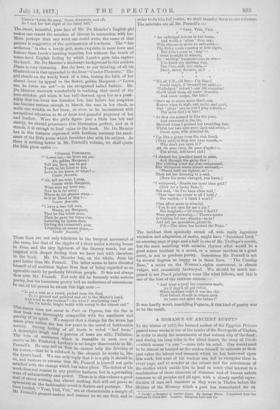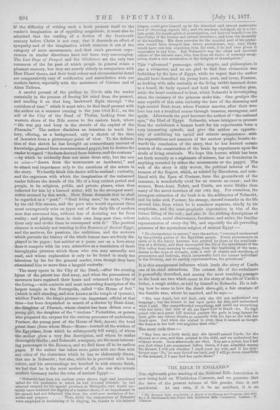A ROMANCE OF ANCIENT EGYPT.*
Ix the winter of 1873, the learned author of the Egyptian Princess passed some weeks in one of the tombs of the Necropolis of Thebes, in order to study the monuments of that solemn city of the dead ; and during his long rides in the silent desert, the story of Garda —which means "a rose "—came into his mind. One would need to be almost as learned as the author himself to estimate at their Just value the labour and research which he has bestowed upon this work, but none of his readers can fail to recognise them in every page, and to wonder at the extent and the minuteness of the studies which enable him to lend so much vital interest to a combination of those elements of romance and of human nature common to all peoples and all ages, with a closely careful repro- duction of men and manners as they were in Thebes before the lifetime of the Mummy which a poet has resuscitated for us.
* Uarda: a Romance of Ancient Egypt. By George Ebore. Translated from the Gorman by Olara I3oll. London : Sampson Low and 00.
If the difficulty of writing such a book present itself to the reader's imagination as of appalling magnitude, it must also be admitted that the reading of a fiction of the fourteenth century before Christ is not easy, that it demands an effort of sympathy and of the imagination which removes it out of the category of mere amusements, and that one's previous expe- riences in similar directions have not been very encouraging. The Last Days of Pompeii and the Gladiators are the only two romances of the far past of which people in general retain a pleasant memory, but they are merely elderly in comparison with Herr Ebers' theme, and their local colour and circumstantial detail are comparatively easy of verification and assimilation with our modern tastes, especially with the assistance of Gdreune and of Alma Tadema.
A careful perusal of the preface to Uarda aids the reader materially in the process of freeing his mind from the present, and sending it on that long backward flight through "the corridors of time" which it must take, to find itself present with the author on a summer evening in the year 1352 B.C., on the soil of the City of the Dead of Thebes, looking from the western shore of the Nile across to the eastern bank, where "life was gay and busy in the streets of the capital of the Pharaohs." The author disclaims an intention to teach his- tory, offering, as a background, only • a sketch of the time of Sesostris from a picturesque point of view. To the delinea- tion of that sketch he has brought an extraordinary amount of
knowledge, gleaned from monuments and papyri, but he desires the reader to regard "the facts derived from history, and the costume" —by which he evidently does not mean dress only, but the naise
en scZne—" drawn from the monuments as incidental," and to attach real importance only to the emotions of the actors in the story. We hardly think this desire will be realised ; curiosity, and the eagerness with which the imagination of the unlearned reader follows the details of the life of a long extinct period and people, in its religious, public, and private phases, when thus collected for him by a learned writer, will be the strongest senti- ments aroused by this work. Herr Ebers demands that he shall be regarded as a "poet." "Real living men," he says, " dwelt by the old Nile stream, and the poet who would represent them must courageously seize on types out of the daily life of modern men that surround him, without fear of deviating too far from reality ; and placing them in their own long-past time, colour them only and clothe them to correspond with it." The poetical element is certainly not wanting in this Romance of Ancient Egypt, and the motives, the passions, the ambitions, and the sorrows .which pervade the history of the whole human race are freely dis- played in its pages ; but neither as a poem nor as a love-story does it compete with its own attraction as a translation of those hieroglyphic pictures which those who run may assuredly not read, and whose explanation is only to be found in study too laborious by far for the general reader, even though they have atimulated him to more than a languid curiosity.
The story opens in the City of the Dead,—after the evening .hymn of the priests has died away, and when the processions of mourners have regained their boats and returned to the City of the Living,—with a minute and most interesting description of the largest temple in the Necropolis, called "the House of Seti "
(which is still standing, and now known as the temple of Qurnah), whither Feuer, the king's pioneer—an important official at that time—has been despatched in search of a doctor by Bent-Anat, the daughter of Pharaoh, whose chariot has been driven over a young girl, the daughter of the " unclean " Parischites, or person who prepared the corpses for the various processes of embalming. Pentaur, the young poet of the House of Seti, Ameni, the head priest there (from whom Mesu—Moses—learned all the wisdom of the Egyptians, from which he subsequently fell away), of whom
the author gives a very fine description, and whom he makes thoroughly lifelike ; and Nebsecht, a surgeon, are the most interest-
ing personages in the Romance, and we find them all in its earliest pages. If the author has taken more pains with one than with any other of the characters which he has so elaborately drawn, that one is Nebsecht; but also, while he is provided with local colour, and his surroundings are touched in with minute finish, we feel that he is the most modern of all, the one who reveals modern Germany under the robe of ancient Egypt :—
" Nebseeht had from his earliest years shown high and hereditary talent for the profeseion to which he had devoted himself; ho had selected surgery for his special province at Heliopolis, and would cer- tainly have attained the dignity of a teacher there, if an impediment in his speech had not debarred him from the vivd-voce recitation of for-
mulas and prayers Thus, while the companions of Nobsoch6 'were employed in declaiming or in singing, he, thanks to his fettered tongue, could give himself up to his inherited and almost passionate love of observing organic life ; and his teachers indulged, up to a cer- tain point, his innate spirit of investigation, end derived benefit fi on] his knowledge of the human and animal structures, and from the dexterity of his handling. His deep aversion for the magical part of his profes- sion would have brought him heavy punishment, nay, very likely would have coat him expulsion from the craft, if he had over given it expression in any form. But Nebsecht'a was the silent and reserved nature of the learned man, who, free from all desire of external recog- nition, finds a rich satisfaction in the delights of investigation."
This " advanced " personage, critic, sceptic, and philosopher, is
also a vivisector, and we are glad to find that vivisection was forbidden by the laws of Egypt, while we regret that the author
should have described his young hero, poet, and lover, Pentaur, as looking with calm curiosity at the living rabbit fastened down to a board, its body opened and held back with wooden pins, while the heart continued to beat, which Nebsecht is investigating-
when the emissary of the princess seeks him. One grudges the man capable of this calm curiosity the love of the charming and high-souled Bent-Anat, whom Pentaur marries, after their true love has run a troubled course through treasons, stratagems, and spoils. Afterwards the poet becomes the author of "the national epic," the Iliad of Egypt. Nebsecht, whose intrigues to procure from the embalmers a human heart for his experiments form a very interesting episode, and give the author an opportu- nity of exhibiting his varied and minute acquaintance with the superstitions and manners of the ancient people, boasts, to- wards the conclusion of the story, that he has learned certain secrets of the construction of the brain by experiments upon the skulls of living criminals. We hope this horror, which has been set forth recently as a nightmare of science, has no foundation in anything revealed by either the monuments or the papyri. The web of the story is ably woven, the political interest of the treason of the Regent, which, as related by Herodotus, and com- bined with the Epos of Pentaur, form the groundwork of the romance, is wonderfully vivid for so remote an event ; and the women, Bent-Anat, Nefert, and Uarda, are more lifelike than many of the novel-heroines of our own day. For ourselves, the strongest attraction of the book is in the soliloquies of Nebsecht, and his talks with Pentaur, his strange, shrewd remarks on the life around him, from which he is somehow separate, chiefly by his scepticism, and the semi-prophetic expectation in him of the future lifting of the veil ; and also in the striking descriptions of habits, rules, social observances, furniture, and attire, the familiar representation of every-day life, and especially the all-pervading presence of the mysterious religion of ancient Egypt :—
" No circumstance in nature," says the author, "remained unobserved by the priestly guides of the Egyptian people. Every phenomenon on earth or in the starry heavens was greeted by them as the manifesta- tion of a divinity, and they surrounded the life of the inhabitants of the Nile valley from morning to evening, from the beginning of the inun- dation to tho days of drought, with a web of chants and sacrifices, of processions and festivals, which inseparably knit the human individual to the Divinity, and its earthly representatives, the priesthood."
It is this omnipresent influence which lends the story of Uarda one of its chief attractions. The outcast life of the embalmers is powerfully described, and among the most touching passages in the book are two which occur in the story of the life of Uarda's father, a rough soldier, as told by himself to Nebsecht. He is tell- ing how he came to love the dumb slave-girl, a fair creature of the Semitic race, whom he married, and he says:—
"She was dumb, but not deaf, only she did not understand our language; but the demon in her oyes spoke for her, and understood what I said. She comprehended everything, and could say everything with her eyes ; but best of all, she knew how to thank one. No high priest who at a great bill festival praises tho gods in long hymns for their gifts can return thanks so earnestly with his lips as she with her dumb eyes. And when she wished to pray, then it seemed as though the demon in her look was mightier than over."
The story ends thus :— " She bore me a little maid, that she herself named Uarda, for she showed us a rose, and then pointed to the child, and we understood her without words. Soon Afterwards she died. You are a priest, but I tell you that when I um summoned before Osiris, if I am admitted among the blessed, I will ask whether I shall meet my wife, and if the doer- keeper says 'No,' he may thrust me back, and I will go down cheerfully to the damned, if I may find her again there."



































 Previous page
Previous page